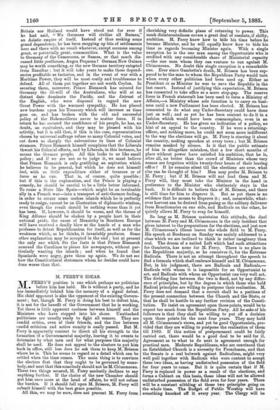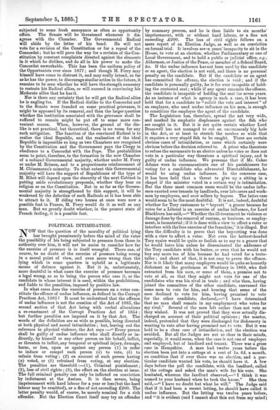M. FERRY'S IDEAS.
MFERRY'S position is one which perhaps no politician
• before him has held. He is without a party, and he has immediately behind him the memory of a signal defeat. His chief opponent is also the opponent of the existing Govern- ment ; but, though M. Ferry is doing his best to defeat him, it is not for the benefit of the Government that he is working. Yet there is little apparent coolness between himself and the Ministers who have stepped into his shoes. Unattached politicians are usually ready to fight all comers. They are candid critics, even of their friends, and the line between candid criticism and active enmity is easily passed. But M. Ferry is apparently content to direct all his strength to the formation of a Governmental majority, leaving it to events to determine by what men and for what purposes this majority shall be used. He does not appeal to the electors to put him back in office, still less does he ask them to keep M. Brisson where he is. This he seems to regard as a detail which can be settled when the time comes. The main thing is to convince the electors first that they ought to be governed by some- body, and next that this somebody should not be M. Clemenceau. These two things secured, M. Ferry modestly declines to say anything further. If the choice of the new Chamber should put him once more at the head of affairs, he will not refuse the burden. If it should fall upon M. Brisson, M. Ferry will submit himself with the best grace possible. All this, we may be sure, does not prevent M. Ferry from
cherishing very definite plans of returning to power. This meek disinterestedness covers a great deal of resolute, if shifty, ambition. M. Ferry knew how to bide his time before he became Minister, and he will equally know how to bide his time as regards becoming Minister again. With a single exception he is the one man among the Opportunists who is credited with any considerable share of Ministerial capacity —the one man whom they can venture to run against M. Clemenceau. No doubt this single exception is a remarkable one. Ever since Gambetta's death, M. Brisson has been sup- posed to be the man to whom the Republican Party would turn when every other politician had been used up. Either as President or as Minister he was to save the Republic in the last resort. Instead of justifying this expectation, M. Brisson has consented to take office as a mere stop-gap. The reserve force in French statecraft has been used to form a Ministry of Affairs,—a Ministry whose sole function is to carry on busi- ness until a new Parliament has been elected. M. Brisson has consented to do what any Under-Secretary could have done just as well ; and as yet he has been content to do it in a fashion which would have been commonplace, even in an Under-Secretary. He has given no indication of a policy, no hint of an appeal to the country. If he were a returning- officer, and nothing more, he could not seem more indifferent to the way the elections will go. M. Ferry is starring it about the country, making speeches at every town ; but M. Brisson remains masked by silence. Is it that the public estimate of him is altogether mistaken, that a few short months of place without power have satisfied his ambition, that he is, after all, no better than the crowd of Ministers whose very names are forgotten within twenty-four hours of their leaving office f If he remains silent till the elections are over, what else can be thought of him ? Men may prefer M. Brisson to M. Ferry ; but if M. Brisson will not lead them and M. Ferry will, they must take the Minister in the hand in preference to the Minister who obstinately stays in the bush. It is difficult to believe this of M. Brisson, and there is still time for him to disprove it. But as yet there is no evidence that he means to disprove it ; and, meanwhile, what- ever harvest can be derived from posing as the solitary deliverer from Reactionaries on one side, and Radicals on the other, he quietly allows M. Ferry to reap for himself.
So long as M. Brisson maintains this attitude, the duel between M. Ferry and M. Clemenceau is the only incident that gives interest to the preparations for the elections, and just now M. Clemenceau's illness leaves the whole field to M. Ferry. His speech at Bordeaux on Sunday was mainly addressed to a class which we are inclined to think is rather imaginary than real. The dream of a united Left which had such attractions for Gambetta, has none for M. Ferry. There is no place in the Republican majority, as he conceives it, for the Extreme Radicals. There is not an attempt throughout the speech to find a formula which shall embrace himself and M. Clemenceau. But, in his judgment, there are Radicals and Radicals,— Radicals with whom it is impossible for an Opportunist to act, and Radicals with whom an Opportunist can very well act. The dividing line between the two is fixed, not by any differ- ence of principles, but by the degree in which those who hold Radical principles are willing to postpone their realisation. M. Ferry does not demand that a recruit shall be a partisan of the present connection between the Church and the State, or that he shall be hostile to any further revision of the Consti- tution. To insist on agreement upon those points, would be to expect too much from the Republican Party. All he asks of his followers is that they shall be willing to put off a decision upon these points for the next four years. They may hold all M. Clemenceau's views, and yet be good Opportunists, pro- vided that they are willing to postpone the realisation of them till 1889. If this notion of postponement could be fairly carried out, there would be a good deal to be said for it. Agreement as to what to do next is agreement enough for practical men. Moderate Republicans, who are convinced that an Established Church is a necessity for Frenchmen, and that the Senate is a real bulwark against Radicalism, might very well pull together with Radicals who were content to accept these two ideas, as having undisturbed possession of the field for four years to come. But it is quite certain that if M. Ferry is replaced in power as a result of the elections, and forms a Cabinet on this basis, these ideas will not be allowed undisturbed possession of the field even for four years. There will be a constant nibbling at these two principles going on the whole time. The Budget of Public Worship will have something knocked off it every year. The Clergy will be subjected to some fresh annoyance as often as opportunity offers. The Senate will be threatened whenever it dis- agrees with the Chamber. The Governmental Radical will abide by the letter of his bond. He will not vote for a revision of the Constitution or for a repeal of the Concordat ; but he will pave the way for a revision of the Con- stitution by constant complaints directed against the elements in it which he dislikes, and do all in his power to make the Concordat unworkable. This has been the uniform policy of the Opportunists ever since 1877 ; and though M. Ferry may himself have come to distrust it, and may really intend, so far as he has the power, to discourage similar action in the future, it remains to be seen whether he will have the strength necessary to restrain his Radical allies, or will succeed in convincing his Moderate allies that he has it.
Nor is there any certainty that he will get the Radical allies he is angling for. If the Radical dislike to the Concordat and to the Senate were founded on some practical grievance, it might be appeased by its removal, and then the larger question whether the institution associated with the grievance shall be suffered to remain might be put off to some more con- venient season. When, however, the ground of the dis- like is not practical, but theoretical, there is no room for any such mitigation. The function of the convinced Radical is to realise the ideal Republic, and the realisation of the ideal Republic is impossible so long as two Chambers are recognised by the Constitution and the Government pays the Clergy in obedience to a Concordat with the Pope. The probabilities seem to point, therefore, to the formation in the new Chamber of a reduced Governmental majority, whether under M. Ferry or under M. Brisson, and to a proportionate reinforcement of M. Clemencean's minority. To what extent this Governmental majority will have the support of Republicans of the type of M. Ribot will depend upon the sincerity of the next Cabinet in putting aside revolutionary proposals, whether they bear on religion or on the Constitution. But in so far as the Govern- mental majority is strengthened by this support, it will be weakened by the defection of such Radicals as it has been able to attract to it. If riding two horses at once were now a possible feat in France, M. Ferry would do it as well as any man. But we greatly doubt whether, in the present state of French feeling, it is a possible feat.



































 Previous page
Previous page